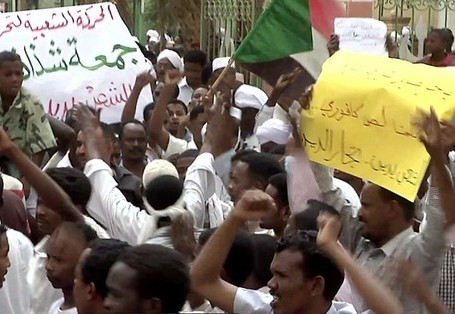Sudan’s NCP defiant amid small protests in Khartoum against electricity rates hike
July 22, 2012 (KHARTOUM) – Sudan’s ruling National Congress Party (NCP) has again dismissed the significance of protests that erupted in different part of the country over the last month describing them as “isolated”.

There was no official explanation from the government regarding the rate change.
The move contradicted government assertions made in the past that electricity rates would remain unchanged following the inauguration of the multi-billion dollar Merowe dam in northern Sudan three years ago.
Police and security officers managed to disperse the protests which continued until late into the night in Buri Lamab and and Jebel Awlia areas in Khartoum State.
Abdel-Jalil al-Karoori, a member of the NCP leadership bureau, said that the protests that began in late June are “isolated” and not reflective of the general sentiments among the people.
He stressed that the government is putting significant efforts to contain the economic crisis and accused the opposition of attempting to exploit it politically.
The International Monetary Fund (IMF) is forecasting that Sudan’s GDP growth will shrink by 7.3% in 2012 following the secession of the oil-rich South a year ago. South Sudan now controls what used to be 75% of the formerly united Sudan’s oil production worth billions of dollars.
The government scrambled to find alternatives in the form of expanding gold exploration which is not expected to make up for the revenue shortfall any time soon. Moreover, Sudanese officials have made little progress in attempts to get financial aid from Arab and friendly nations.
China, a major ally of Sudan, has suspended funding to dozens of projects citing the lack of oil collateral after South Sudan broke away.
In a bid to redeem the state’s ailing finances, the government announced a number of measures including the lifting subsidies on fuel which increased frustration among ordinary Sudanese who are struggling to make ends meet amid rising prices.
Annual inflation hit 37.2% in June this year, double the level in June 2011.
Furthermore, the government partially devalued the currency in a bid to further align it with the black market exchange rate and encourage those with US dollars to sell them in the official market. The move meant that Sudan will pay more for imports considering that much of its needs, including many basic food products come from abroad.
The government has also slashed ministries on the federal and local levels to cut expenses but economists say that the step is largely symbolic and would have a negligible impact on the budget.
Despite widespread anger among Sudanese citizens with the measures, only small protests broke out, which saw the participation of few hundred. Khartoum insists that the demonstrations do not amount to an “Arab Spring” as activists have hoped.
In Khartoum, a senior NCP official further downplayed its significance.
“Of more than 5,000 mosques in Khartoum only two protested [after Friday prayers]. That can give you the size of the whole thing,” NCP’s external relations secretary Ibrahim Ghandour told Reuters.
Ghandour revealed that the government would keep in place some fuel subsidies until the end of 2013 to minimise social pressures.
“I don’t think the government will go and fully lift subsidies to oil. That would be a very unwise political and economic decision,” he said.
The NCP official said the austerity measures would generate savings of 7 billion pounds, enough to close a finance gap of around 6.5 billion pounds, stated by Finance Minister Ali Mahmoud Abdel-Rasool, due to the loss of oil revenues.
“The goodies… of those economic arrangements are expected to start coming out at the end of the year provided that the Bank of Sudan [central bank] was able to support the pound,” Ghandour said.
He acknowledged that the central bank has been unable to stop a slide of the pound against the dollar, despite the partial devaluation.
“Until now they managed [to stabilise] to a degree but now the dollar is coming up in the equivalent [black] market,” the NCP official said.
“The Bank of Sudan [central bank] cannot in my opinion continue to support the pound against the dollar. They need new measures,” Ghandour added.
To stop the slide Ghandour said the central bank should license more foreign currency exchange bureaus to attract more dollars from Sudanese who are using the black market.
“Why don’t we open exchange offices for whoever wishes to sell and buy?” he said. “There are few very exchange offices.”
However, he ruled out a total liberalisation of the exchange rate, saying this would be a “disastrous” move.
(ST)
